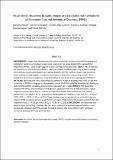Visual stress responses to static images are associated with symptoms of Persistent Postural Perceptual Dizziness (PPPD)
Abstract
BACKGROUND: Images that deviate from natural scene statistics in terms of spatial frequency and orientation content can produce visual stress (also known as visual discomfort), especially for migraine sufferers. These images appear to over-activate the visual cortex. OBJECTIVE: To connect the literature on visual discomfort with a common chronic condition presenting in neuro-otology clinics known as persistent postural perceptual dizziness (PPPD). Sufferers experience dizziness when walking through highly cluttered environments or when watching moving stimuli. This is thought to arise from maladaptive interaction between vestibular and visual signals for balance. METHODS: We measured visual discomfort to stationary images in patients with PPPD (N=30) and symptoms of PPPD in a large general population cohort (N=1858) using the Visual Vertigo Analogue Scale (VVAS) and the Situational Characteristics Questionnaire (SCQ). RESULTS: We found that patients with PPPD, and individuals in the general population with more PPPD symptoms, report heightened visual discomfort to stationary images that deviate from natural spectra (patient comparison, F (1, 1865) = 29, p < 0.001; general population correlations, VVAS, rs (1387) = 0.46, p < 0.001; SCQ, rs (1387) = 0.39, p < 0.001). These findings were not explained by co-morbid migraine. Indeed, PPPD symptoms showed a significantly stronger relationship with visual discomfort than did migraine (VVAS, zH = 8.81, p < 0.001; SCQ, zH = 6.29, p < 0.001). CONCLUSIONS: We speculate that atypical visual processing – perhaps due to a visual cortex more prone to over-activation – may predispose individuals to PPPD, possibly helping to explain why some patients with vestibular conditions develop PPPD and some do not.
Citation
Powell , G , Penacchio , O , Derry-Sumner , H , Rushton , S K , Rajenderkumar , D & Sumner , P 2021 , ' Visual stress responses to static images are associated with symptoms of Persistent Postural Perceptual Dizziness (PPPD) ' , Journal of Vestibular Research , vol. Early View . https://doi.org/10.3233/VES-190578
Publication
Journal of Vestibular Research
Status
Peer reviewed
ISSN
1878-6464Type
Journal article
Description
This study funded by Wellcome [104943/Z/14/Z], Wellcome and Cardiff University ISSF [097824/Z/11/Z], and Health and Care Research Wales [SCF-18-1504].Collections
Items in the St Andrews Research Repository are protected by copyright, with all rights reserved, unless otherwise indicated.

